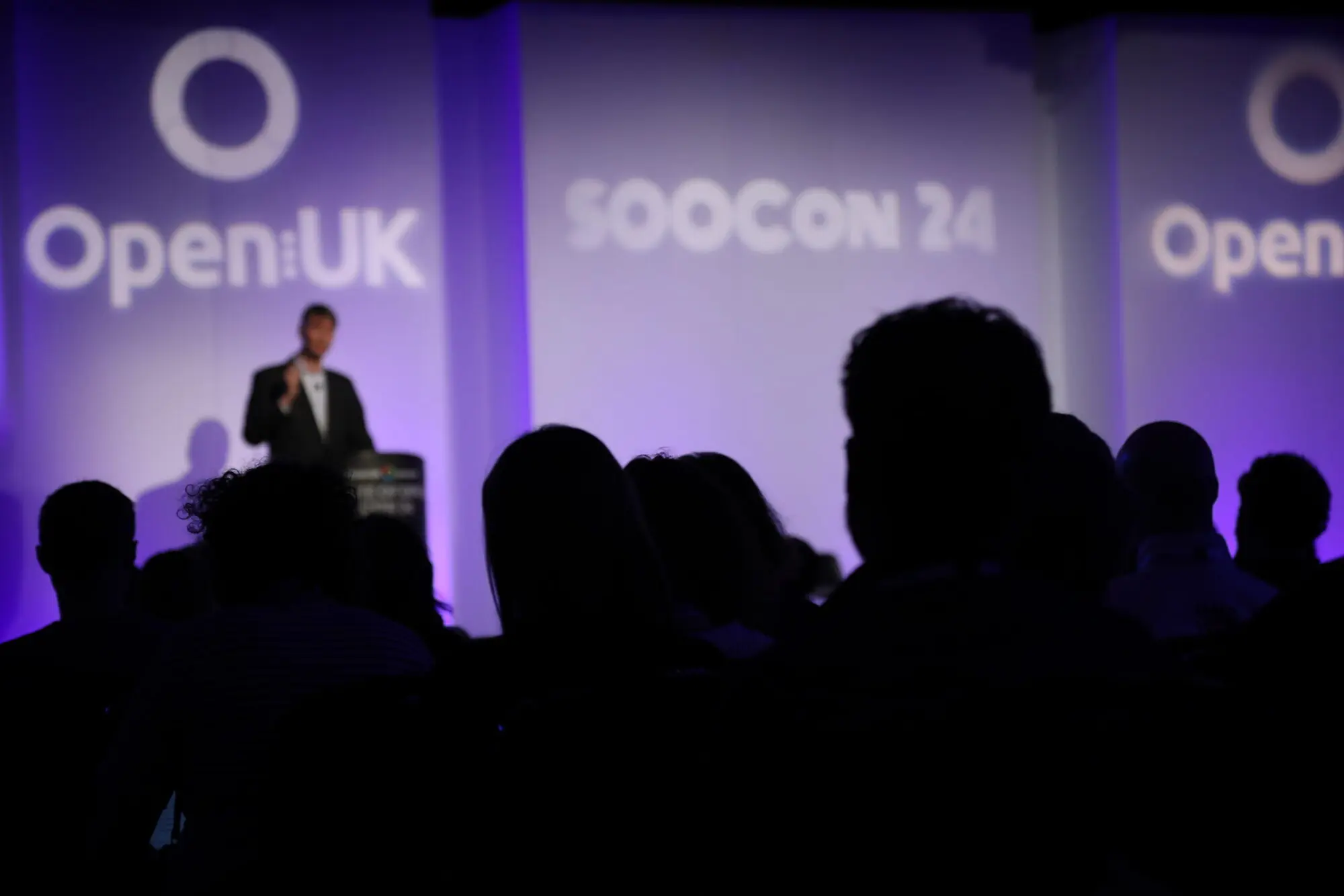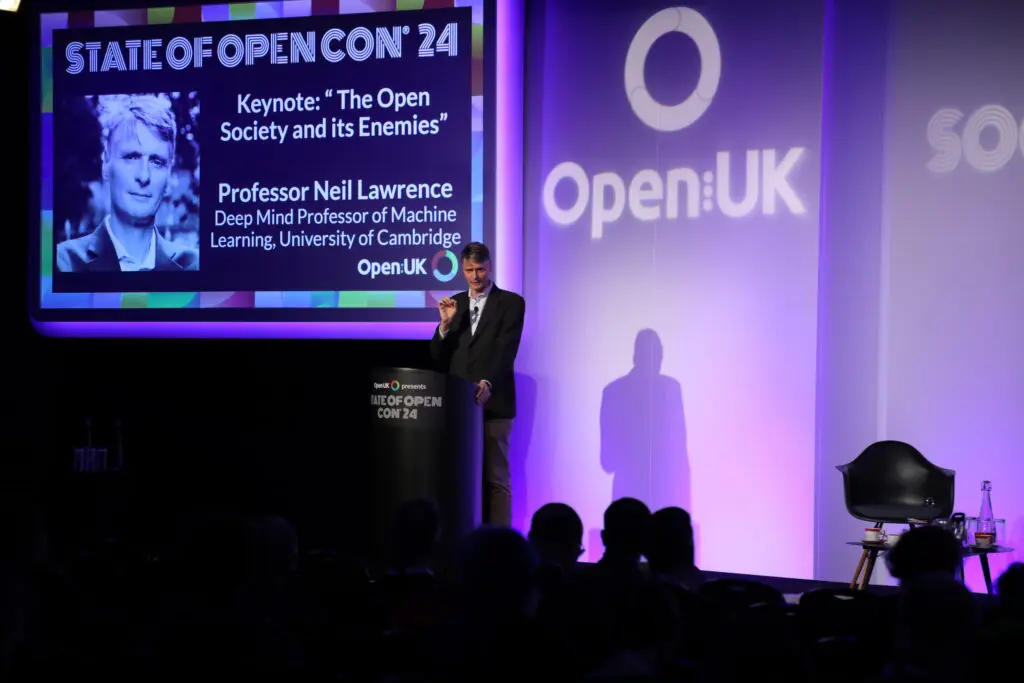State of Open conference reflections

This month I was fortunate to attend and speak at the State of Open Conference run by OpenUK. This is a UK conference for all things open technology: open source, open data, open standards, open hardware, and AI openness.
One thing that became obvious throughout the event was how relevant open technology is, and not only for those of us engaged in that community. The topics of discussion have the interest of the public and are being discussed in both the House of Lords and Commons, with ongoing legislative developments in the UK, EU, and globally.
To illustrate this, the conference featured Chi Onwurrah, the Shadow Minister for Science, Innovation and Research, who delivered a keynote on Open Innovation for the Nation. Baroness Stowell, Chair of the House of Lords’ Communications & Digital Select Committee, gave a talk on Large language models and generative AI. The Home Office and the Department for Science, Innovation and Technology were in attendance to consult with the open source community on AI regulation. This was not a niche technology conference, nor was it a political gathering. It was a well-attended and diverse event on modern technology, about topics that will affect all of our lives.
A repeated phrase was that ‘open source has won’, and it’s hard to argue with that. It’s calculated that 96% of code bases incorporate open source, with 76% of that code being open source. The old arguments of openly licensed products being either poor quality or insecure no longer hold any weight.
It’s a comparable situation with data. Although open data publishing has been patchy, we can see where it has become essential in day-to-day life. The transport sector would not operate efficiently, or provide crucial information to users, without transport data being openly available. This month OpenStreetMap has been registered as a “Digital Public Good” by the Digital Public Goods Alliance, a United Nations-endorsed initiative. It’s widely understood that access to data is a good thing, but also that making data open makes that data better.
This quality factor is relevant for startups. Open technology isn’t popular purely to make savings on license costs. Open source software is better quality than proprietary. Datasets that are openly licensed have more visibility and opportunity for improvement than those with limited exposure. The ‘Open’ mark of quality for data and software is important for startups.
The whole conference was a great learning experience. Here are a few talks that I’d particularly recommend, with YouTube links.

Neil Lawrence – The Open Society and its Enemies
This was one of the most impressive presentations I’ve been fortunate to witness. Neil Lawrence delivered an informative, educational, and entertaining talk that ranged from the philosophies of Socrates and Popper, via the Sorcerer’s Apprentice, to a modern-day commentary on AI.
Neil mentioned that his delivery without notes was inspired by Socrates, who believed that writing a speech was cheating, rather than being ‘off the cuff’. Listening to a speech given confidently without notes is an inspiring experience (although understandably not possible for many people) and this was a powerful example.
Watch The Open Society and its Enemies.
Chi Onwurrah – Open Innovation for the Nation
Chi Onwurrah delivered a keynote on Open Innovation. It was great to hear about her technical background, and of being the MP who is “the closest thing to a dev in the House”. People often bemoan the number of software developers in the field of software development, and that’s a fair concern. But it’s also fair to say we need more software developers in the area of public policy.
The talk was a good example of how open technology has become a focus of government policy in recent years. This includes understanding how developing in the open makes people more empowered, democratises technology, and makes technology more accessible.
Watch Open Innovation for the Nation.
Bruce Perens – What comes after Open Source?
Not allowing anyone to rest on the laurels of open technology success, Bruce poured cold water over the achievements of open source, plenty of which are his own good work. Particularly how it has enabled large companies to make billions while maintainers of essential open source libraries remain uncompensated. If open source has won, what is the reward? It seems to be a significant power differential between corporations and developers.
Bruce started with a fabulous early line of “I am not a happy speaker…I am going to tell you how we have failed”. Then introduced the proposal of ‘Post-Open’, an alternative mechanism that would fairly compensate contributors and make it easier for companies and organisations to utilise openly developed code.
Watch What comes after Open Source?
Jack Gilmore – Unleashing Open Data with GitHub Actions
A really practical talk. Many of our startups use GitHub to store code (other providers are available), and will be familiar with features like GitHub Actions for automation and build.
Jack gave a great introduction to using GitHub for data pipelines. One particular aspect I was interested in was using self-hosted runners. GitHub has limits on the number of processing minutes you can use, as well as data limits on the machines that do that processing. By using self-hosted runners you can use your own infrastructure for this. This is easily configured (even on a Raspberry Pi) and allows you to maintain your automation within GitHub but outsource the processing to more tailored infastructure.
Watch Unleashing Open Data with GitHub Actions.
Hopefully this selection may whet your appetite for more open technology content, or even to attend State of Open Con 2025. Thanks to OpenUK for arranging such an important event, and to Amanda Brock, CEO of OpenUK, who is a force of nature in co-ordinating such a great set of speakers and influencers.